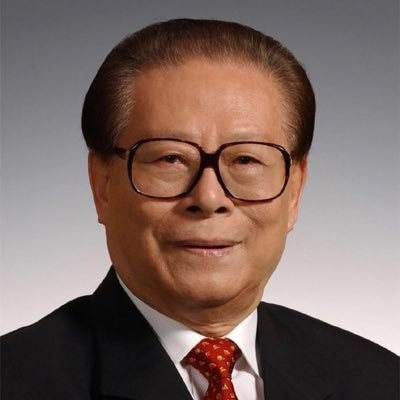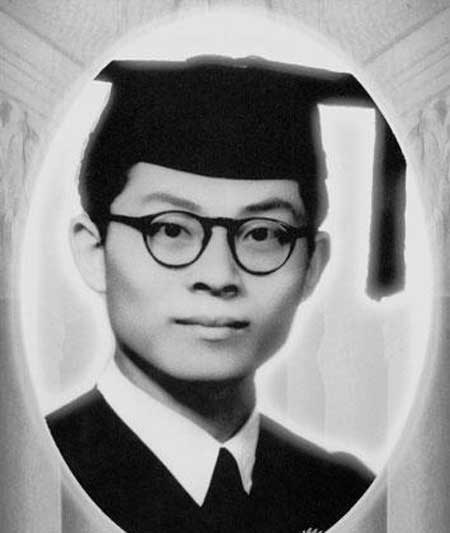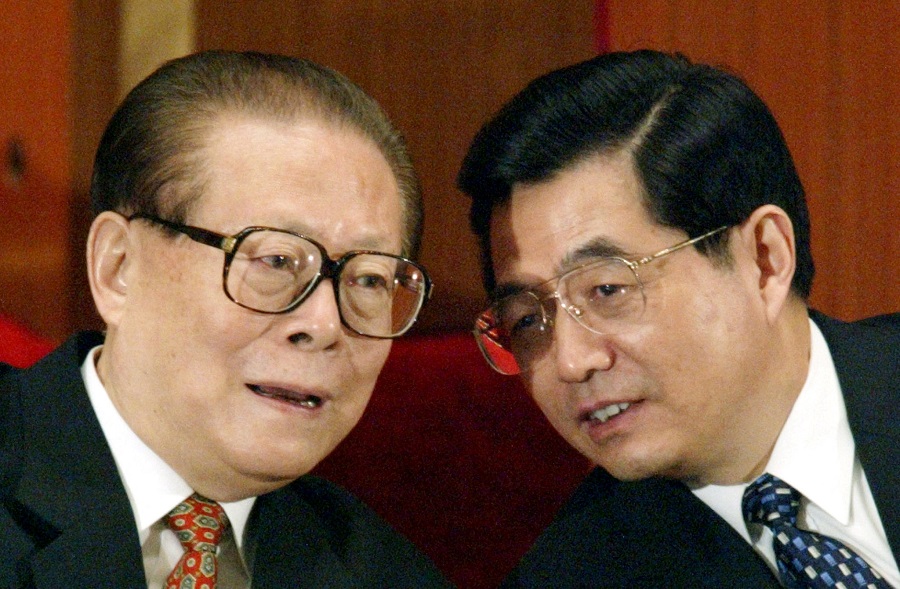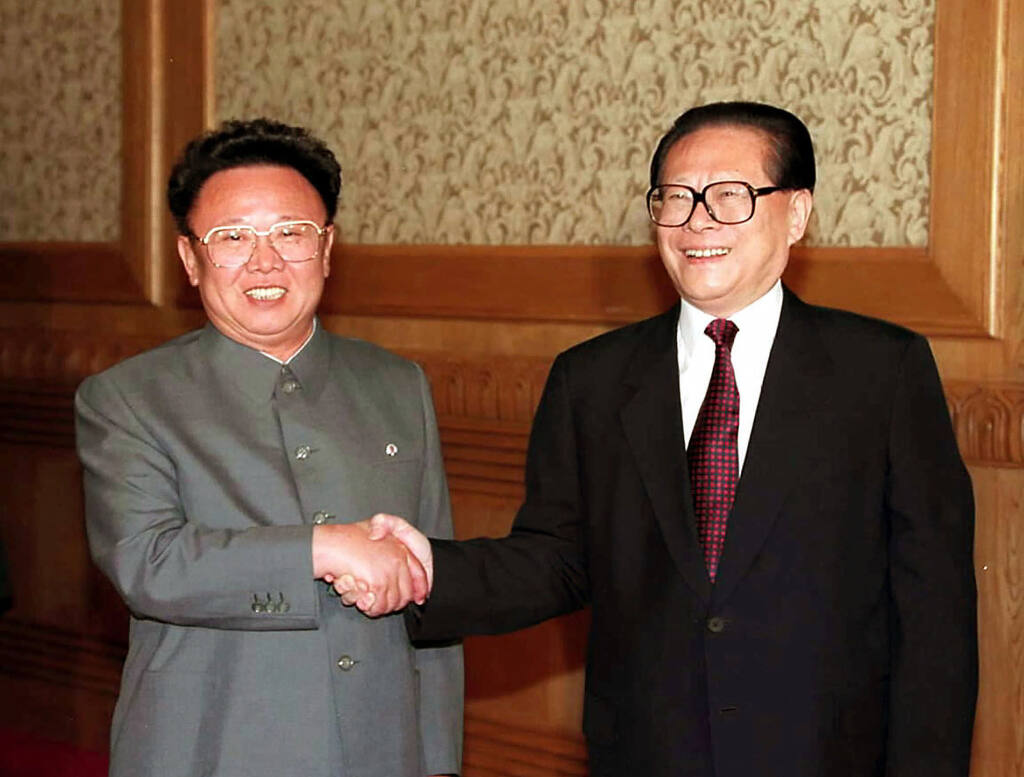More languages
More actions
(Minor edits) Tag: Visual edit |
General-KJ (talk | contribs) (Fixed template) |
||
| (6 intermediate revisions by 2 users not shown) | |||
| Line 1: | Line 1: | ||
{{Infobox politician|native_name=江泽民|birth_date=17 August 1926|birth_place=Yangzhou, Jiansu, [[Republic of China]]|death_date=30 November 2022|death_place=[[Shanghai]], [[China]]|death_cause=Leukemia and organ failure|nationality=Chinese|political_line=[[Marxism–Leninism]]<br>[[Mao Zedong Thought]]<br>[[Socialism with Chinese Characteristics]]<br>[[Three Represents]]|political_party=[[Communist Party of China]]|image=Jiang Zemin.png}} | {{Infobox politician|native_name=江泽民|birth_date=17 August 1926|birth_place=Yangzhou, Jiansu, [[Republic of China]]|death_date=30 November 2022|death_place=[[Shanghai]], [[China]]|death_cause=Leukemia and organ failure|nationality=Chinese|political_line=[[Marxism–Leninism]]<br>[[Mao Zedong Thought]]<br>[[Socialism with Chinese Characteristics]]<br>[[Three Represents]]|political_party=[[Communist Party of China]]|image=Jiang Zemin.png}} | ||
'''Jiang Zemin''' (17 August 1926 – 30 November 2022) was a [[People's Republic of China|Chinese]] politician who served as [[General Secretary of the Communist Party of China|General Secretary of the]] [[Communist Party of China]] from 1989 to | '''Jiang Zemin''' (17 August 1926 – 30 November 2022) was a [[People's Republic of China|Chinese]] [[Marxism–Leninism|Marxist–Leninist]] politician and theorist who served as [[General Secretary of the Communist Party of China|General Secretary of the]] [[Communist Party of China]] from 1989 to 2002, [[Chairman of the Central Military Commission]] from 1990 to 2005, and [[President of the People's Republic of China]] from 1993 to 2003. Jiang represented the "[[Leadership core|core]] of the [[Generations of Chinese leadership|third generation]]" of <abbr title="Communist Party of China">CPC</abbr> leaders since 1989.<ref>{{Web citation|newspaper=[[CGTN]]|title=Jiang Zemin passes away|date=2022-11-30|url=https://news.cgtn.com/news/2022-11-30/Jiang-Zemin-passes-away-1fnPb7HiO2Y/index.html|retrieved=2022-11-30}}</ref> [[Democratic People's Republic of Korea|Korean]] leader [[Kim Jong-un]] said Jiang devoted all his life to the happiness of the Chinese people.<ref>{{Web citation|newspaper=[[CGTN]]|title=More world leaders mourn passing of former Chinese leader Jiang Zemin|date=2022-12-03|url=https://news.cgtn.com/news/2022-12-03/More-world-leaders-mourn-passing-of-former-Chinese-leader-Jiang-Zemin-1fslwiVS9A4/index.html|archive-url=https://web.archive.org/web/20221203062230/https://news.cgtn.com/news/2022-12-03/More-world-leaders-mourn-passing-of-former-Chinese-leader-Jiang-Zemin-1fslwiVS9A4/index.html|archive-date=2022-12-03|retrieved=2022-12-03}}</ref> | ||
Jiang's presidency saw him preside over immense economic growth for China, the 1997 and 1999 handovers of [[Hong Kong Special Administrative Region|Hong Kong]] and [[Macao Special Administrative Region|Macao]] back to China, the Asian financial crisis, floods, crackdown on the [[Falun Gong]], and China's entry into the [[World Trade Organization]]. Jiang's contribution to Marxism–Leninism and [[socialism with Chinese Characteristics|socialism with Chinese characteristics]] is known as the "important thought of the [[Three Represents]]". | |||
== Life == | == Life == | ||
| Line 9: | Line 11: | ||
He entered the Electrical Machinery Department at Central University in [[Nanjing|Nanjing.]]<ref name=":1" /> | He entered the Electrical Machinery Department at Central University in [[Nanjing|Nanjing.]]<ref name=":1" /> | ||
Jiang became a [[Marxism|Marxist]] during college due to his involvement in the anti-[[Empire of Japan (1868–1947)|Japanese]] resistance movement.<ref name=":0" /> These included patriotic movements | Jiang became a [[Marxism|Marxist]] during college due to his involvement in the anti-[[Empire of Japan (1868–1947)|Japanese]] resistance movement.<ref name=":0" /> These included patriotic movements led by underground CPC members in 1943.<ref name=":2" /> This led him to join the Communist Party of China in 1946.<ref name=":1" /> | ||
[[File:Jiang-Zemin-graduation-1947.jpg|thumb|Jiang's graduation photo from 1947]] | [[File:Jiang-Zemin-graduation-1947.jpg|thumb|Jiang's graduation photo from 1947]] | ||
He graduated from Jiao Tong University in Shanghai in 1947 and became employed in a food factory.<ref name=":1" /><ref name=":0" /> | He graduated from Jiao Tong University in Shanghai in 1947 and became employed in a food factory.<ref name=":1" /><ref name=":0" /> | ||
=== Post- | === Post-revolution === | ||
In 1949, Jiang became the deputy director of Shanghai Yimin Food No. 1 Factory, the deputy director of Shanghai Soap Factory, and headed the electrical engineering department at Shanghai No. 2 Design Division of the First Ministry of Machine-Building Industry.<ref name=":1" /> | In 1949, Jiang became the deputy director of Shanghai Yimin Food No. 1 Factory, the deputy director of Shanghai Soap Factory, and headed the electrical engineering department at Shanghai No. 2 Design Division of the First Ministry of Machine-Building Industry.<ref name=":1" /> | ||
In September | In September 1954, he went to Changchun to work for the First Automotive Works. He left China in April 1955 to travel to the [[Union of Soviet Socialist Republics (1922–1991)|Soviet Union]] for an internship for a year at the Stalin Automobile Works before returning to China in 1956. Upon returning he became the deputy chief engineer for dynamic mechanics, deputy chief of the dynamic mechanics division, and director of the power factory for First Automotive Works.<ref name=":1" /><ref name=":0" /> | ||
In 1962, he was the director of the Shanghai Electrical Apparatus Research Institute. Then, in May of 1966 he became the director of the Wuhan Heat-Power Machinery Institute. In 1970, he joined the First Ministry of Machine-Building Industry.<ref name=":1" /> | In 1962, he was the director of the Shanghai Electrical Apparatus Research Institute. Then, in May of 1966 he became the director of the Wuhan Heat-Power Machinery Institute. In 1970, he joined the First Ministry of Machine-Building Industry.<ref name=":1" /> | ||
| Line 28: | Line 30: | ||
In 1982, he became the secretary and vice-minister of the Leading Party Members Group of the Ministry of Electronics Industry and then became the secretary and minister of the Leading Party Members Group one year later.<ref name=":1" /> | In 1982, he became the secretary and vice-minister of the Leading Party Members Group of the Ministry of Electronics Industry and then became the secretary and minister of the Leading Party Members Group one year later.<ref name=":1" /> | ||
==== Later | ==== Later life ==== | ||
Before the 16th National Congress of the CPC in | Before the 16th National Congress of the CPC in November 2002, Jiang announced he would retire as General Secretary of the CPC and support the new leadership of [[Hu Jintao]]. Jiang retired from the position of Chairman of the Central Military Commission in March 2005 during the 10th National People's Congress.<ref name=":1" /><ref name=":0" /> | ||
He personally edited the Selected Works of Jiang Zemin.<ref name=":1" /> | He personally edited the Selected Works of Jiang Zemin.<ref name=":1" /> | ||
| Line 38: | Line 40: | ||
Jiang Zemin died on 30 November 2022 in Shanghai at the age of 96.<ref>{{Web citation|author=Xinhua|newspaper=Xinhua|title=Xi remembers late leader Jiang in New Year address|date=2022-12-31|url=https://english.news.cn/20221231/47e8ce8828a44bb190e72e8f0d7f500d/c.html|retrieved=2023-07-19}}</ref> The cause of death was considered to be leukemia and multiple organ failure.<ref name=":0" /> Following his death, the national flags at Tian'anmen, Zhongnanhai, the Great Hall of the People, and all Chinese embassies were flown at half mast until his funeral on 6 December.<ref>{{Web citation|author=Chang Sha, Liang Jun|newspaper=[[People's Daily]]|title=Announcement by Comrade Jiang Zemin's Funeral Committee (No. 1)|date=2022-11-30|url=http://en.people.cn/n3/2022/1201/c90000-10178425.html|retrieved=2022-11-30}}</ref> | Jiang Zemin died on 30 November 2022 in Shanghai at the age of 96.<ref>{{Web citation|author=Xinhua|newspaper=Xinhua|title=Xi remembers late leader Jiang in New Year address|date=2022-12-31|url=https://english.news.cn/20221231/47e8ce8828a44bb190e72e8f0d7f500d/c.html|retrieved=2023-07-19}}</ref> The cause of death was considered to be leukemia and multiple organ failure.<ref name=":0" /> Following his death, the national flags at Tian'anmen, Zhongnanhai, the Great Hall of the People, and all Chinese embassies were flown at half mast until his funeral on 6 December.<ref>{{Web citation|author=Chang Sha, Liang Jun|newspaper=[[People's Daily]]|title=Announcement by Comrade Jiang Zemin's Funeral Committee (No. 1)|date=2022-11-30|url=http://en.people.cn/n3/2022/1201/c90000-10178425.html|retrieved=2022-11-30}}</ref> | ||
His remains were sent to Beijing where he was cremated at the Babaoshan Revolutionary Cemetery on | His remains were sent to Beijing where he was cremated at the Babaoshan Revolutionary Cemetery on 5 December.<ref>{{Web citation|author=Xinhua|newspaper=Xinhua|title=Jiang Zemin's remains transferred to Beijing|date=2022-12-01|url=https://english.news.cn/20221201/35aced5941c240319255f559b1c4dd4b/c.html|retrieved=2023-07-19}}</ref><ref name=":3">{{Web citation|author=Xinhua|newspaper=Xinhua|title=Jiang Zemin's remains cremated in Beijing|date=2022-12-05|url=https://english.news.cn/20221205/74599df4a53e4e5f8ed8fa90d0031d13/c.html|retrieved=2023-07-19}}</ref> His ashes were scattered at the sea where it meets the Yangtze River.<ref>{{Web citation|author=Xinhua|newspaper=Xinhua|title=Ashes of Jiang Zemin scattered into sea|date=2022-12-11|url=https://english.news.cn/20221211/3069d28d5b654dc0bfd80765d7b2ce39/c.html|retrieved=2023-07-19}}</ref> | ||
== Leadership == | == Leadership == | ||
In 1985, Jiang became mayor of [[Shanghai]] and deputy secretary of the Shanghai Municipal Committee of the CPC. The first plenary session of the 13th [[Central Committee of the Communist Party of China|Central Committee]] in 1987 elected him to the Politburo and made him secretary of the Shanghai Municipal Committee. While leading Shanghai, he led it to increase in the common prosperity.<ref name=":1" /><ref name=":0" /> | In 1985, Jiang became mayor of [[Shanghai]] and deputy secretary of the Shanghai Municipal Committee of the CPC. The first plenary session of the 13th [[Central Committee of the Communist Party of China|Central Committee]] in 1987 elected him to the Politburo and made him secretary of the Shanghai Municipal Committee. While leading Shanghai, he led it to increase in the common prosperity.<ref name=":1" /><ref name=":0" /> | ||
He joined the Political Bureau of the CPC Central Committee in November | He joined the Political Bureau of the CPC Central Committee in November 1987. He was appointed to this position at the initial plenary session of the 13th CPC Central Committee.<ref name=":1" /> | ||
He then joined the Standing Committee of the Political Bureau of the CPC Central Committee and became general secretary of the Central Committee in June | He then joined the Standing Committee of the Political Bureau of the CPC Central Committee and became general secretary of the Central Committee in June 1989.<ref name=":1" /><ref name=":0" /> He became the chairman of the Central Military Commission in March 1990 at the 7th National People's Congress.<ref name=":1" /><ref name=":0" /> | ||
He became the chairman of the Central Military Commission in March 1990 at the 7th National People's Congress.<ref name=":1" /><ref name=":0 | |||
Jiang became president of the People's Republic of China in March 1993. While he was president, he continued to develop the theory of the Three Represents.<ref name=":1" /> | |||
[[File:PassingTheBaton.jpg|thumb|Jiang Zemin, left, next to newly-elected president [[Hu Jintao]] in March 2003]] | |||
Jiang's leadership was noted by China overcoming the Asian financial crisis and China properly handling the 1998 floods.<ref name=":1" /> | Jiang's leadership was noted by China overcoming the Asian financial crisis and China properly handling the 1998 floods.<ref name=":1" /> | ||
=== Return of Hong Kong and Macao === | |||
Jiang peacefully liberated | Jiang peacefully liberated Hong Kong and Macao from European [[colonialism]] and reunified them with China.<ref name=":0" /> | ||
Hong Kong was returned to China on July 1, 1997 and Macao was returned on December 20, 1999.<ref name=":1" /> | Hong Kong was returned to China on July 1, 1997 and Macao was returned on December 20, 1999.<ref name=":1" /> | ||
=== Crackdown on Falun Gong === | |||
Jiang initiated a formal crackdown on the nationalist religious cult [[Falun Gong]]. The cult espoused fanatical counterrevolutionary beliefs, going so far as to advocate the destruction of the PRC, reactionary views on feminism and homosexuality, and is funded by the CIA, making it apparent that it was irreconcilably contradictory to modern China and | Jiang initiated a formal crackdown on the nationalist religious cult [[Falun Gong]]. The cult espoused fanatical counterrevolutionary beliefs, going so far as to advocate the destruction of the PRC, reactionary views on feminism and homosexuality, and is funded by the CIA, making it apparent that it was irreconcilably contradictory to modern China and Marxism as a whole. Jiang's administration formally outlawed the cult in 1999 and created the 610 Office to continue to crack down on their activities. | ||
=== Foreign policy === | |||
[[File:Kim-Jiang.jpg|thumb|Jiang Zemin, right, with [[Kim Jong-il]] in June 2000]] | [[File:Kim-Jiang.jpg|thumb|Jiang Zemin, right, with [[Kim Jong-il]] in June 2000]] | ||
Foreign policy in the Jiang Zemin administration primarily followed the groundwork set by the [[Deng Xiaoping]] administration. Jiang made many attempts to improve China's relations with the [[United States of America|United States]]. In 1998, on a visit to China, US president Bill Clinton said that the two countries were "partners in the world, not adversaries". Despite this claim, multiple instances of US aggression occurred during the Jiang administration, including the the illegal apprehension of the ''Yinhe'' in 1993 and the NATO bombing of the Chinese Embassy in Belgrade in 1999. | Foreign policy in the Jiang Zemin administration primarily followed the groundwork set by the [[Deng Xiaoping]] administration. Jiang made many attempts to improve China's relations with the [[United States of America|United States]]. In 1998, on a visit to China, US president Bill Clinton said that the two countries were "partners in the world, not adversaries". Despite this claim, multiple instances of US aggression occurred during the Jiang administration, including the the illegal apprehension of the ''Yinhe'' in 1993 and the NATO bombing of the Chinese Embassy in Belgrade in 1999. | ||
=== Economic development === | |||
During the leadership of Jiang, the PRC joined the [[World Trade Organization]] in December | During the leadership of Jiang, the PRC joined the [[World Trade Organization]] in December 2001.<ref name=":1" /> | ||
An example of Jiang's leadership is notable in his push for the creation of the [[Shanghai Cooperation Organisation|Shanghai Cooperation Organization]]. This was the regional-based cooperation group that China took part in.<ref name=":1" /> | An example of Jiang's leadership is notable in his push for the creation of the [[Shanghai Cooperation Organisation|Shanghai Cooperation Organization]]. This was the regional-based cooperation group that China took part in.<ref name=":1" /> | ||
| Line 75: | Line 73: | ||
=== Three Represents === | === Three Represents === | ||
Jiang developed the theory of | Jiang developed the theory of Three Represents, which represents China's [[productive forces]], its advanced culture, and the interests of the majority of its people.<ref name=":2" /><ref name=":0" /><ref name=":3" /> | ||
=== Other areas === | === Other areas === | ||
| Line 81: | Line 79: | ||
=== Family and personal life === | === Family and personal life === | ||
Jiang was married to Wang Yeping.<ref name=":3" /> | Jiang was married to Wang Yeping.<ref name=":3" /> | ||
== Works== | |||
* [http://book.theorychina.org/upload/9912d625-487c-4b71-bc52-c514d6037af2/| Selected Works of Jiang Zemin Volume I] | |||
* [http://book.theorychina.org/upload/388036ce-a4ae-4eec-ab04-85254ea5b72f/| Selected Works of Jiang Zemin Volume II] | |||
== Works == | |||
* | |||
* | |||
== References == | == References == | ||
[[Category:Outline needs additional content]] | [[Category:Outline needs additional content]] | ||
[[Category:Chinese communists]] | [[Category:Chinese communists]] | ||
[[Category:Chinese leaders]] | [[Category:Chinese leaders]] | ||
Latest revision as of 16:04, 4 September 2024
Jiang Zemin 江泽民 | |
|---|---|
 | |
| Born | 17 August 1926 Yangzhou, Jiansu, Republic of China |
| Died | 30 November 2022 Shanghai, China |
| Cause of death | Leukemia and organ failure |
| Nationality | Chinese |
| Political orientation | Marxism–Leninism Mao Zedong Thought Socialism with Chinese Characteristics Three Represents |
| Political party | Communist Party of China |
Jiang Zemin (17 August 1926 – 30 November 2022) was a Chinese Marxist–Leninist politician and theorist who served as General Secretary of the Communist Party of China from 1989 to 2002, Chairman of the Central Military Commission from 1990 to 2005, and President of the People's Republic of China from 1993 to 2003. Jiang represented the "core of the third generation" of CPC leaders since 1989.[1] Korean leader Kim Jong-un said Jiang devoted all his life to the happiness of the Chinese people.[2]
Jiang's presidency saw him preside over immense economic growth for China, the 1997 and 1999 handovers of Hong Kong and Macao back to China, the Asian financial crisis, floods, crackdown on the Falun Gong, and China's entry into the World Trade Organization. Jiang's contribution to Marxism–Leninism and socialism with Chinese characteristics is known as the "important thought of the Three Represents".
Life[edit | edit source]
Early life[edit | edit source]
Jiang was born on August 17, 1926 in Yangzhou in the Jiangsu province. His family were Chinese patriots and this viewpoint influenced him while growing up.[3][4]
He entered the Electrical Machinery Department at Central University in Nanjing.[3]
Jiang became a Marxist during college due to his involvement in the anti-Japanese resistance movement.[5] These included patriotic movements led by underground CPC members in 1943.[4] This led him to join the Communist Party of China in 1946.[3]

He graduated from Jiao Tong University in Shanghai in 1947 and became employed in a food factory.[3][5]
Post-revolution[edit | edit source]
In 1949, Jiang became the deputy director of Shanghai Yimin Food No. 1 Factory, the deputy director of Shanghai Soap Factory, and headed the electrical engineering department at Shanghai No. 2 Design Division of the First Ministry of Machine-Building Industry.[3]
In September 1954, he went to Changchun to work for the First Automotive Works. He left China in April 1955 to travel to the Soviet Union for an internship for a year at the Stalin Automobile Works before returning to China in 1956. Upon returning he became the deputy chief engineer for dynamic mechanics, deputy chief of the dynamic mechanics division, and director of the power factory for First Automotive Works.[3][5]
In 1962, he was the director of the Shanghai Electrical Apparatus Research Institute. Then, in May of 1966 he became the director of the Wuhan Heat-Power Machinery Institute. In 1970, he joined the First Ministry of Machine-Building Industry.[3]
During the 1960s, he organized the design of nuclear power equipment. From 1971 to 1973, he was the head of an expert machine-building team in Romania.[3][5]
Then, in 1973, he became the director of the Foreign Affairs Bureau of the First Ministry of Machine-Building Industry.[3]
In 1980, Jiang was appointed as the secretary-general and vice-chairman of the State Administration Commission on Import and Export Affairs and the State Administration Commission on Foreign Investment.[3]
In 1982, he became the secretary and vice-minister of the Leading Party Members Group of the Ministry of Electronics Industry and then became the secretary and minister of the Leading Party Members Group one year later.[3]
Later life[edit | edit source]
Before the 16th National Congress of the CPC in November 2002, Jiang announced he would retire as General Secretary of the CPC and support the new leadership of Hu Jintao. Jiang retired from the position of Chairman of the Central Military Commission in March 2005 during the 10th National People's Congress.[3][5]
He personally edited the Selected Works of Jiang Zemin.[3]
Official appearances after retirement[edit | edit source]
Death[edit | edit source]
Jiang Zemin died on 30 November 2022 in Shanghai at the age of 96.[6] The cause of death was considered to be leukemia and multiple organ failure.[5] Following his death, the national flags at Tian'anmen, Zhongnanhai, the Great Hall of the People, and all Chinese embassies were flown at half mast until his funeral on 6 December.[7]
His remains were sent to Beijing where he was cremated at the Babaoshan Revolutionary Cemetery on 5 December.[8][9] His ashes were scattered at the sea where it meets the Yangtze River.[10]
Leadership[edit | edit source]
In 1985, Jiang became mayor of Shanghai and deputy secretary of the Shanghai Municipal Committee of the CPC. The first plenary session of the 13th Central Committee in 1987 elected him to the Politburo and made him secretary of the Shanghai Municipal Committee. While leading Shanghai, he led it to increase in the common prosperity.[3][5]
He joined the Political Bureau of the CPC Central Committee in November 1987. He was appointed to this position at the initial plenary session of the 13th CPC Central Committee.[3]
He then joined the Standing Committee of the Political Bureau of the CPC Central Committee and became general secretary of the Central Committee in June 1989.[3][5] He became the chairman of the Central Military Commission in March 1990 at the 7th National People's Congress.[3][5]
Jiang became president of the People's Republic of China in March 1993. While he was president, he continued to develop the theory of the Three Represents.[3]

Jiang's leadership was noted by China overcoming the Asian financial crisis and China properly handling the 1998 floods.[3]
Return of Hong Kong and Macao[edit | edit source]
Jiang peacefully liberated Hong Kong and Macao from European colonialism and reunified them with China.[5]
Hong Kong was returned to China on July 1, 1997 and Macao was returned on December 20, 1999.[3]
Crackdown on Falun Gong[edit | edit source]
Jiang initiated a formal crackdown on the nationalist religious cult Falun Gong. The cult espoused fanatical counterrevolutionary beliefs, going so far as to advocate the destruction of the PRC, reactionary views on feminism and homosexuality, and is funded by the CIA, making it apparent that it was irreconcilably contradictory to modern China and Marxism as a whole. Jiang's administration formally outlawed the cult in 1999 and created the 610 Office to continue to crack down on their activities.
Foreign policy[edit | edit source]

Foreign policy in the Jiang Zemin administration primarily followed the groundwork set by the Deng Xiaoping administration. Jiang made many attempts to improve China's relations with the United States. In 1998, on a visit to China, US president Bill Clinton said that the two countries were "partners in the world, not adversaries". Despite this claim, multiple instances of US aggression occurred during the Jiang administration, including the the illegal apprehension of the Yinhe in 1993 and the NATO bombing of the Chinese Embassy in Belgrade in 1999.
Economic development[edit | edit source]
During the leadership of Jiang, the PRC joined the World Trade Organization in December 2001.[3]
An example of Jiang's leadership is notable in his push for the creation of the Shanghai Cooperation Organization. This was the regional-based cooperation group that China took part in.[3]
Legacy[edit | edit source]
Three Represents[edit | edit source]
Jiang developed the theory of Three Represents, which represents China's productive forces, its advanced culture, and the interests of the majority of its people.[4][5][9]
Other areas[edit | edit source]
Family and personal life[edit | edit source]
Jiang was married to Wang Yeping.[9]
Works[edit | edit source]
References[edit | edit source]
- ↑ "Jiang Zemin passes away" (2022-11-30). CGTN. Retrieved 2022-11-30.
- ↑ "More world leaders mourn passing of former Chinese leader Jiang Zemin" (2022-12-03). CGTN. Archived from the original on 2022-12-03. Retrieved 2022-12-03.
- ↑ 3.00 3.01 3.02 3.03 3.04 3.05 3.06 3.07 3.08 3.09 3.10 3.11 3.12 3.13 3.14 3.15 3.16 3.17 3.18 3.19 3.20 3.21 Xinhua (2022-12-03). "Profile: Jiang Zemin's great, glorious life" Xinhua. Retrieved 2023-07-18.
- ↑ 4.0 4.1 4.2 Xi Jinping (2022-12-07). "Full text of Xi Jinping's speech at memorial meeting for Comrade Jiang Zemin" Xinhua. Retrieved 2023-07-19.
- ↑ 5.00 5.01 5.02 5.03 5.04 5.05 5.06 5.07 5.08 5.09 5.10 "Jiang Zemin passes away" (2022-11-30). Xinhua. Retrieved 2022-11-30.
- ↑ Xinhua (2022-12-31). "Xi remembers late leader Jiang in New Year address" Xinhua. Retrieved 2023-07-19.
- ↑ Chang Sha, Liang Jun (2022-11-30). "Announcement by Comrade Jiang Zemin's Funeral Committee (No. 1)" People's Daily. Retrieved 2022-11-30.
- ↑ Xinhua (2022-12-01). "Jiang Zemin's remains transferred to Beijing" Xinhua. Retrieved 2023-07-19.
- ↑ 9.0 9.1 9.2 Xinhua (2022-12-05). "Jiang Zemin's remains cremated in Beijing" Xinhua. Retrieved 2023-07-19.
- ↑ Xinhua (2022-12-11). "Ashes of Jiang Zemin scattered into sea" Xinhua. Retrieved 2023-07-19.
